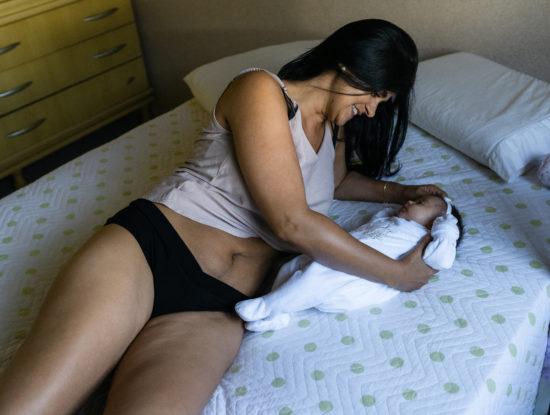It’s you… but different. Here’s how to get your head around the physical changes that pregnancy brings.

While you might be one of the lucky ones who’s totally relaxed about their post-baby bod, never feel bad if it’s not that easy. A lot of women struggle with the changes that happen to them after they go through labour.
Knowing what will happen in advance can make it easier to prepare. Here’s what you can expect…
You may feel that way because your muscles have stretched during pregnancy so your tummy won’t ping back straight away to how it was before. For a while, it’ll be a bit looser.
You might not know this but breastfeeding can help as it causes contractions that shrink the womb. And it burns calories. Postnatal exercise can tone your pelvic floor and tummy muscles, and eating healthily will help (sometimes easier said than done with a new baby!)
While you’re pregnant, your stomach muscles may become separated.

They should return to normal by the time your baby is eight weeks old. If they are still separated, speak to your GP about getting a referral to a physiotherapist.
To tell whether your stomach muscles are still separated, put one hand on your tummy with your fingers on the midline of your naval.
Press your finger down gently and bring your head up (shoulders on the ground) like you’re doing a mini-crunch. Feel for the sides of your muscles and see if they are still separated.
During pregnancy you might have noticed stretch marks developing on your stomach, breasts and inner thighs. They look like narrow pink or purple lines. After birth these should fade.
Stretch marks will become less noticeable although they’re unlikely to completely disappear. You can buy products aimed at removing stretch marks, but there is little evidence that these work. If you are particularly self-conscious about your stretch marks, you can have laser therapy but be warned, it can be pricey.
Yes, a lot of women experience back pain after giving birth.
You should:
If back pain persists, speak to your GP.
Yes. It’s common to feel incredibly tired after you have given birth. Your body has been through a lot and your baby is likely to wake several times during the night. But it will get better.
Try early nights and the old but true cliché of resting when your baby’s asleep. If you’re formula or combi feeding, share the night feeds with your partner. Find out more about tiredness after birth here.
If you are particularly irritable, stressed or down, speak to your health visitor. They might look at other underlying causes like postnatal depression.
An estimated 39% of women will experience a headache in the first week after giving birth.
Drink plenty of water and take paracetamol or ibuprofen.
Tell your GP if you have a severe or persistent headache, especially if you had an epidural. It could be a sign of eclampsia (high blood pressure), which might require further treatment.
Pregnant women and women who have had a baby in the past six weeks are at an increased risk of deep vein thrombosis. The symptoms are a swollen, painful leg and/or difficulty breathing.
Deep vein thromboses are caused by a clot developing in the deep veins of your leg. It can be fatal if the clot travels from your legs to your lungs. If you develop a swollen, painful leg or have breathing difficulties after a trip, see your GP urgently or go to the nearest A&E department.
Our #HiddenHalf campaign won the right for new mums to have a check up with their GP at six weeks that was just for them. This should give mums the time and space to talk about their mental and physical health. Find out more about what happens at the six-week check.
Our support line offers practical and emotional support with feeding your baby: 0300 330 0700.
To prepare yourself more for what happens during and after labour, we offer antenatal courses which are a great way to find out more about birth, labour and life with a new baby.
You might find attending one of our Early Days groups helpful as they give you the opportunity to explore different approaches to important parenting issues with a qualified group leader and other new parents in your area.
Make friends with other parents-to-be and new parents in your local area for support and friendship by seeing what NCT activities are happening nearby.